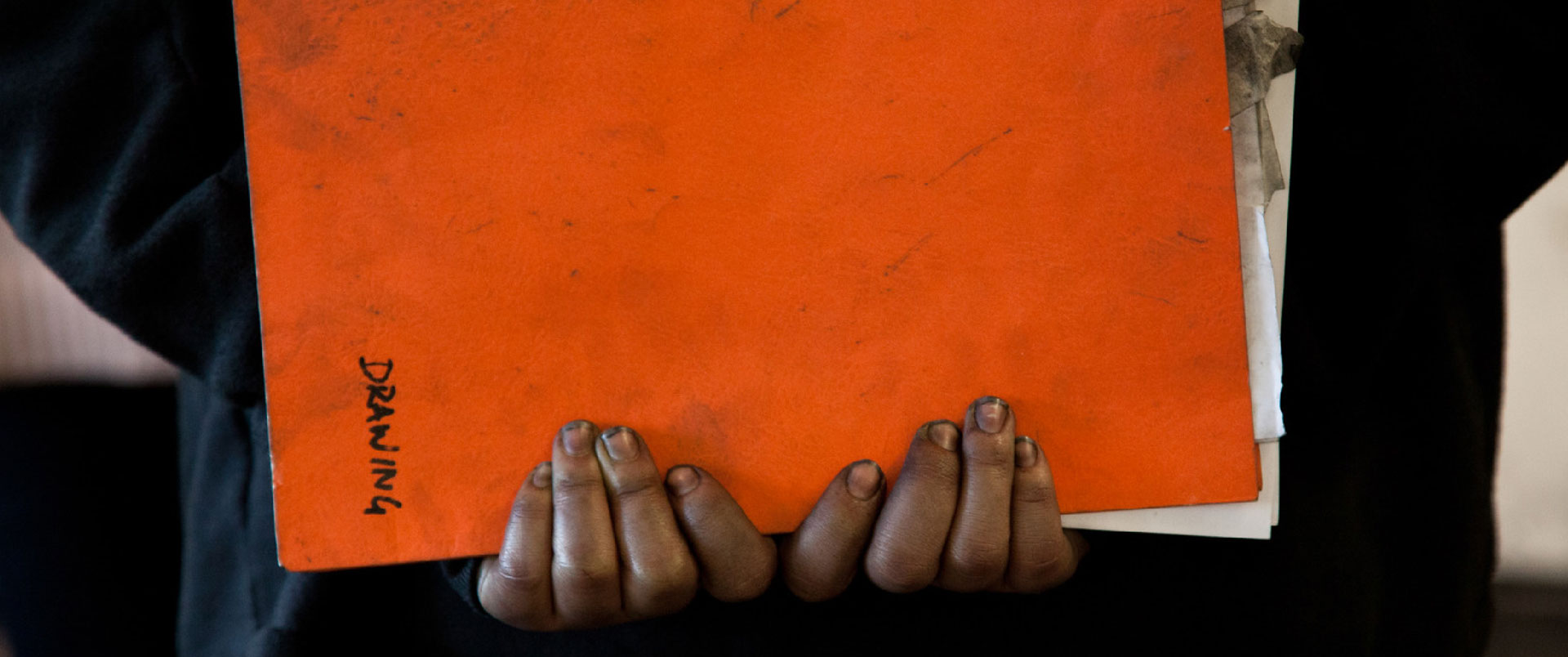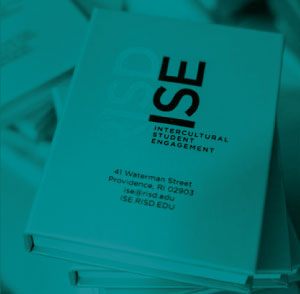THE DEAN OF FACULTY OFFICE
RISD’s Dean of Faculty oversees the faculty hiring process, including onboarding, mentoring, and orientation, and faculty development initiatives, including the Center for SEI’s Teaching and Learning Lab. The Dean of Faculty also supports the faculty evaluation, promotion, and critical review processes, providing guidance and one-on-one consultations to faculty, department heads, and deans. The Recruitment and Development Coordinator supports the Dean of Faculty in all these efforts.

Nicole M. Merola (PhD, English Literature, University of Washington) is Professor of Environmental Humanities & American Literatures. She teaches courses on a range of environmental humanities topics, including biodiversity and extinction studies, climate change cultures, discourses of the anthropocene, ecological literary studies, and theories of natureculture. In these and other courses, she asks students to consider the role mediating technologies, such as novels, poems, photographs, paintings, built environments, and critical theory, play in apprehending and interrogating structures of classed, gendered, and racialized socioecological relationship.
Dr. Merola’s current environmental humanities scholarship focuses on the intersection of affect, form, and socioecologies in contemporary culture. Key aims of this work are to particularize and historicize environmental emotion and highlight bodily vulnerability at scales from the personal to the planetary. Additional areas of research interest include: community-based learning, critical and inclusive pedagogies, models of cross-disciplinary co-teaching, and place-based learning.

Justine Bubar
Faculty Recruitment & Development Coordinator
jbubar@risd.edu
(401) 709-8482
Justine Bubar is the Faculty Recruitment and Development Coordinator here at RISD. She graduated with a BA in English from Guilford College in Greensboro, North Carolina in 2010.
Justine supports the Faculty Search Process in conjunction with the goals and initiatives of the Center for Social Equity and Inclusion. Additionally, Justine supports the T&L Lab SEI Workshop Series, the Frazier Award Committee, the Faculty Steering Committee, and Sabbatical and Professorial Presentations.

Dimitris C. Papadopoulos
Instructional Designer
dpapadop@risd.edu
401-427-3047
Dimitris (he/him) is the instructional designer at the Teaching & Learning Lab.
He supports faculty in using RISD’s learning management system (Canvas), and in integrating instructional technology and digital pedagogy tools, from Miro and Hypothesis to generative AI, that best fit learning objectives and that facilitate engaging and inclusive learning. For more info about workshops, consultations, and resources, you can visit the instructional design and technology page.

Faculty Hiring
RISD requires open searches for most faculty positions and is committed to attracting diverse pools of applicants. We recognize diversity and inclusion as fundamental to our learning community and integral to an art and design education, and welcome applicants whose experience in teaching, scholarship, professional practice, and/or service has prepared them to contribute to our commitment to diversity and excellence.
I. Introduction and Social Equity and Inclusion Statement:
RISD requires open searches for most faculty positions and is committed to attracting diverse pools of applicants. We recognize diversity and inclusion as fundamental to our learning community and integral to an art and design education, and welcome applicants whose experience in teaching, scholarship, professional practice, and/or service has prepared them to contribute to our commitment to diversity, a reflective and inclusive pedagogy, and innovative and equitable curricular and community engagements.
II. Types of Hires:
Full-time critical review track: Currently, there are over one hundred and ten faculty either past, or on, the critical-review track at RISD. Critical review track faculty teach 18 credits/year, advise students, participate in curriculum development and other divisional activities and projects, serve on college committees, contribute to the vibrancy of the intellectual life of the college, and maintain active professional practices.
Full-time term appointments: Annually, RISD hires approximately 40 full-time faculty in residence on one-to-two year term appointments. Faculty in residence are typically hired at the Assistant Professor rank, and are granted all the rights and responsibilities of full-time faculty per the union contract.
Part-time hires: Adjunct faculty teach more than 50% of the courses at RISD, and RISD hires approximately 100 new adjuncts each year. Whether staffing existing courses, addressing pressing curricular needs, or planning new directions for the curriculum, part-time hires have a major impact.
Faculty Fellowships: Externally advertised fellowships are offered through various centers at RISD, notably the Center for Social Equity and Inclusion, which hires fellows on an annual basis. Fellowships come with reduced teaching loads to facilitate research projects and cross-institutional collaboration.
III. Searches and Hiring:
Spring Hiring Timeline: Terms & New Adjuncts
Mini-searches for term appointments (Assistant/Associate Professors in Residence)
Guidelines for hiring Part-time Faculty
Sign-in Page for Search Committee Members
IV. Best Practices for Search Committees:
1. Search Committee Charge and Confidentiality Statement
2. Checking for Implicit Bias:
- Please watch these short videos (30 minutes in total) on implicit bias developed by UCLA.
- Common Interviewer Biases
3. Interview Guidelines
At RISD, semi-finalist interviews for critical review track positions take place over zoom. Finalist interviews take place on-campus and include the following components:
- A teaching demonstration
- A public research/practice presentation
- Meetings with the department head, the divisional dean, and the dean of faculty and director of academic administration

Evaluation, Promotion, and Critical Review
At RISD the evaluation process is designed to be transparent, iterative, and supportive. Both full-time faculty in the probationary (pre-critical review) period and post-critical review complete evaluation forms on a regular basis in order to reflect on accomplishments and aspirations and frame their pedagogy, research, and creative and scholarly practices.
Union Contracts
Appendices ( for full-time faculty only)
Appendix A – CRITERIA FOR FACULTY PERFORMANCE
Appendix B – FACULTY REPORT (self-evaluation form submitted to DH and Dean)
Appendix C – DEPARTMENT HEAD AND DEAN REPORT (of faculty member)
Appendix E – APPLICATION FOR FACULTY OR LIBRARIAN OF PRE-CRITICAL REVIEW LEAVE
COLLEGIAL MEETING FORM FOR DEPARTMENT HEADS AND PART-TIME FACULTY MEMBERS
Guidelines for Evaluation, Review, and Dossier preparation:
For Department Heads and Deans:
Department Head and Dean: Roles, Responsibilities, and Guidelines for the Evaluation Process
Teaching Observation and Feedback form for Department Heads and Deans
Guidelines for requesting external reference letters (for faculty, Department Heads, and Deans)
Student Evaluations: Best Practices for administering and interpreting
For Faculty:
Evaluation Basics for Pre-critical Review Faculty
Quick Tips for Preparing your Critical Review or Promotion Dossier
Guidelines for requesting external reference letters (for faculty, Department Heads, and Deans)
Deadlines for Faculty and Librarian Review, Reappointment, Promotion
Supplementary Resources:
Teaching Philosophy:
Teaching Philosophy: brief guidelines and best practices
For a full range of excellent resources related to writing a teaching philosophy statement please see the following page on the University of Michigan’s Center for Research on Learning and Teaching website: The Teaching Philosophy and Statement.
Some excellent articles on writing a teaching philosophy from the Chronicle of Higher Education:
- “How to Write a Statement of Teaching Philosophy” by Gabriela Montell, The Chronicle of Higher Education
- “What’s Your Philosophy on Teaching, and Does it Matter?” by Gabriela Montell, The Chronicle of Higher Education
Sabbatical Reports:
Sabbatical Reports: Suggested Best Practices
Getting the most out of your evaluations:
Student Evaluations: Best Practices for administering and interpreting
Prompts for Instructor-Designed student evaluation questions

Orientations
The Dean of Faculty Office organizes annual orientations for faculty, department heads, and deans.




